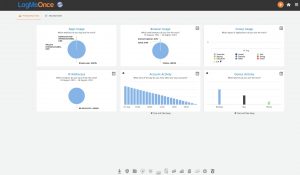

And that starts with great security software application. An anti-virus program is a piece of software that keeps your computer system (or phone, tablet, etc) safe from other software that tries to attack it.
PCWorld is continuously covering the most recent news in infections and other dangers, and how to defend against them. For the best antivirus software in 2023, make sure to have a look at our comprehensive roundup of the very best antivirus programs.
What is a computer virus?
To understand what antivirus software does, you need to know what a bug is. “Virus” in this context has a broad meaning, however to put it simply, it’s a program that gets installed on your computer system, then automatically spreads itself to other computers across a network or the web, mimicking the spread of a biological infection spreading out through an organism’s cells.
What precisely an infection does depends on the specific infection, however it’s never good. In the early days of computers, a great deal of viruses were designed simply to damage your computer system for the sake of pure mischief. The popular “ILOVEYOU” virus spread through email downloads and simply overwrote files on the hard disk drive with junk information, until the computer system ended up being unsteady and needed to be entirely cleaned.
Then there are viruses designed to take remote control of your computer system, frequently without you realizing it, in order to create a secret network called a “botnet.” Botnets like MyDoom can be used to spread spam or scams, or attack other computer systems with dispersed traffic created to close down web services.
The most insidious and personally hazardous type of infection, and the more typical one in the modern world, is created to take from users themselves. This can be done several ways. A “spyware” or “spybot” program searches the files on your computer for your individual information like login passwords or bank accounts, while “ransomware” locks down your files and advises you to send out money to bad guys to get them back. Typically these will be sent out as emails or websites pretending to be something they’re not, like a vital software application update you require to click on, a process called “phishing.”.
In these cases, the self-replicating viral factor may not even exist, so the software isn’t even technically an infection. Other terms, like “worm,” “trojan” (as in the Trojan Horse) or the more all-encompassing “malware” might be more precise.
What is antivirus software application?
The types of danger are broad and varied, however antivirus software application is developed to find and stop them all. Anti-virus software also constantly scans both your computer and your network traffic to recognize hazards.
What does antivirus software do?
The most simple way an anti-virus program can secure against viruses is by scanning your files. The anti-virus software take advantage of a big database of known infections, trojans, and other sort of malware– thousands and thousands of different kinds, constantly being upgraded– and look for them on the files in your computer. The anti-virus program even scans brand-new files that you download right away, consisting of installable programs that may hide infections behind other programs like games or tools.
When the antivirus program finds a file that it’s determined as malware, it immediately separates the file from the rest of your computer system and prevents it from running any operations that might impact other files or programs. With the threat isolated, it then thoroughly erases the harmful files. Typically it will display some sort of alert letting you know that it’s found and neutralized the risk.
This approach of security has actually proven to be extremely reliable, but it’s not ideal. A virus or a piece of malware needs to be identified prior to it can be contributed to the detection database … which suggests that for a minimum of some quantity of time, it needs to be active “in the wild” of the web before the database gets updated. That’s a great reason to practice basic computer security at all times, for instance, not downloading unidentified programs or opening email attachments from untrusted sources.
What’s the distinction in between anti-viruses and a firewall software?
Anti-virus software application mostly scans your computer’s files and programs. A firewall program is a piece of software that directly scans traffic entering and out of your computer system on both your local network and the web. This is important for your security, due to the fact that firewall programs can be used to obstruct destructive information from can be found in or heading out. This can be utilized to prevent a program from sending your individual information out, or avoid a program from outdoors your computer system’s network from managing it from another location.
Some anti-viruses software application consists of at least some type of fundamental firewall software performance to supplement its file and program scanning tools. Windows Defender, a basic antivirus checker, and Defender Firewall, are both part of the integrated Windows Security system. Bundled firewall programs are enough for fundamental security for a lot of users, while devoted firewall software (or even advanced hardware-based firewalls) are normally for big corporations or companies, needing devoted management by security professionals.
Are there any computer systems that don’t need antivirus?
If you have a Windows desktop or laptop that’s linked to the internet, you need an antivirus program. Desktop computers have been linking to the web for over 50 years at this moment, and viruses and other malware designed to infect them have actually been spreading out for simply as long. Searching the web without some kind of security in place is sort of like swimming in sewage: sooner or later, you’re going to get an infection.
Luckily, Windows PCs have integrated protection in the form of Windows Security, a basic anti-viruses and firewall software suite that’s included totally free with the operating system. As long as you can keep that upgraded (which it does instantly through Windows Update), you’re covered at the standard level. However what about other devices that link to the internet, like your phone, tablet, your smart television, or even linked devices like your security cameras or smart lights?
Smart devices have actually ended up being so common that, yes, there are viruses and malware out there developed to infect them. They’re specifically tempting for wrongdoers since a lot personal details is saved on them. But unlike desktops and laptop computers, iOS and (most) Android phones can’t download just any program out there, they have to go to the “main” Apple App Store or Google Play Store to get apps and video games.
Apple and Google control the security for these programs on the server end. It’s not a perfect system– viruses, spyware, and malware have actually survived their detection filters prior to. But for the vast bulk of users, this basic level of protection is enough that they don’t need to run additional anti-virus software.
Android phones are a bit of a diplomatic immunity here. Unlike iPhones, many Android devices can install programs that have not been pre-approved by Google in a procedure called side-loading. This resembles setting up a third-party program on Windows. And much like Windows, you require to be careful that you rely on the source of the download if you install this software. Even here, Google has executed a system called Play Protect that carries out standard antivirus and anti-malware scanning for all apps, even those that are sideloaded. If you desire even more defense, it’s readily available.
The very same general concept uses to any gadget that gets its content and apps from managed sources, and doesn’t include open-ended access to the web, like clever TVs, e-readers, wise watches, et cetera. So long as the company handling the content watches on it, you actually do not have to worry about infections made specifically for those devices, particularly since there’s not much individual info at stake. That’s not a universal rule– it’s possible for practically any linked device to be compromised– however these devices are much lower priorities for malefactors.
Is Windows Defender a great anti-virus solution?
The default security settings that came with Windows weren’t always up to snuff. Twenty years back, you ‘d be called negligent for running Windows without any kind of add-on security software application.
The antivirus scanner constructed into Windows is constantly updated with the most recent risk detection, and stated updates are baked right into Windows itself. Most of the time you won’t even observe it running in the background, unless it straight spots and neutralizes a danger. Ditto for the basic built-in firewall program in Windows Security: Aside from the occasional tweak essential to grant network access to third-party apps and video games, you’ll most likely forget it’s there.
If you’re running Windows and you don’t have any money to spare for more robust security, relax. You’ll still be great as long as you keep your computer upgraded through Windows Update, and do not go looking for specifically sketchy software.
Is Norton 360 a great antivirus service?
Norton is a great option if your store essential or delicate data on your PC, or you share it with other users who might not have the very best judgment. In addition to standard file scanning, the membership consists of access to a VPN, dark web monitoring to signal you when your accounts have actually been compromised, complimentary cloud storage, and a password screen. It’s costly, however a great choice for a “total plan” security service for up to 5 gadgets.
Is Avast anti-viruses any excellent?
Avast has actually remained in the video game for a long period of time, and it stays a strong option that’s cheaper than Norton. It does not have all of the very same features, but its resource hit is lighter, and it’s cheaper if you require to protect a ton of devices (as much as 30 at the highest tier) simultaneously. It’s a terrific option if you need anti-virus and other security features on a PC that needs to run hot, like a gaming or media production desktop.
Read our complete Avast One evaluation here.
Is AVG Internet Security worth the price?
AVG used to be a go-to pick for antivirus, due to the fact that the basic variation was complimentary. It stays a popular option thanks to a much-improved interface and regular virus scanner updates.
Is Trend Micro an excellent antivirus program?
Frankly, it’s not a great option if you understand what you’re performing in regards to advanced PC maintenance. Trend Micro Maximum Security is practical and very easy to use, making it an excellent option for those who are less than tech-savvy. Its more innovative features are both less robust and less trusted than the competitors, and it does not use much of a rate benefit.
Is McAfee Antivirus any excellent?
McAfee is one of the earliest names in PC security … and kid, do they understand it. The software application is amongst the most costly on the marketplace on a per-device basis. While it uses some special functions like the “file shredder” safe and secure delete and house network analyzer, it’s hard to suggest for anyone on a spending plan.







